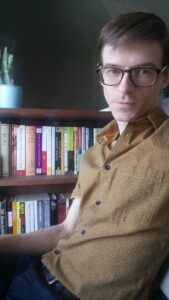Each month, we ask a member of faculty to tell us about one book that played an outsized role in making them who they are today. For our final Words to Live By before the newsletter hiatus, we chat with Tim Clarke, Assistant Professor and Associate Director of Student Support (FYP), about a book he first read during a chilly Ottawa winter in 2013—and which he’s revisited many times since.
What book have you chosen?
 The Ethics, Baruch Spinoza’s posthumous magnum opus and one of the most exhilarating pieces of philosophy I’ve ever read. It almost has no right to be that exciting—it has one of the dullest titles imaginable and it’s filled with pseudo-geometrical proofs of highly technical philosophical claims—but there’s nothing else quite like it.
The Ethics, Baruch Spinoza’s posthumous magnum opus and one of the most exhilarating pieces of philosophy I’ve ever read. It almost has no right to be that exciting—it has one of the dullest titles imaginable and it’s filled with pseudo-geometrical proofs of highly technical philosophical claims—but there’s nothing else quite like it.
When did you first read this book?
I first read it while living in Ottawa in 2013, during a bitterly cold winter that I spent living in a miniscule bachelor apartment with defective heating. I read a lot of it while huddling over the open door of my oven for warmth.
Was it a book that you read quickly or did you take your time reading it?
I read it very quickly—and very poorly—the first time around, but it’s a much friendlier text if you’re willing to sink a bit of time into it. It really rewards patience and a more leisurely pace.
What was it about the book that first stood out to you?
Its radically naturalistic definition of God. A good part of the Ethics consists in elaborating the consequences of the vision of God that it lays out in the first few pages, but it’s a vision devoid of theological content. Spinoza’s God has no human characteristics, doesn’t judge right and wrong, doesn’t preside over any heaven or hell and has no expectations of worship. Eventually, we see that when Spinoza writes God, he means “Deus sive natura,” God or nature. God isn’t a supernatural, transcendent master, rather God is nature itself, in the broadest possible sense: the living universe in all its activity, together with the infinite web of mutual entanglements and dependencies that makes it up. What initially sounds like a pious exaltation of the otherworldly divine ends up being a celebration of this worldly life. It’s staggering.
Have you reread this book? If so, did you get something different from it on rereading?
I revisit the Ethics every couple of years. I find something new each time, or some piece of the argument that had mystified me the last time suddenly clicks, or I end up changing my mind about how to interpret some part of the argument that I thought was settled. At any rate, I never come back empty-handed.
How did this book shape you?
 No book has been more formative for me. I was so swept up when I read it that I completely reimagined my dissertation. I did my doctoral work in English, so I never imagined that I’d spend half of it thinking about Spinoza, but my dissertation ended up being an elaborate excuse to study the traces of Spinozan influence on American letters. It’s also just become part of furniture of my mental life—it isn’t a manual for living or anything like that, but it’s a resource for thinking about how you, as a finite, limited thing, relate to an infinite, unlimited world full of other finite, limited things. There aren’t many books that have genuinely changed my life, but this is absolutely one of the them.
No book has been more formative for me. I was so swept up when I read it that I completely reimagined my dissertation. I did my doctoral work in English, so I never imagined that I’d spend half of it thinking about Spinoza, but my dissertation ended up being an elaborate excuse to study the traces of Spinozan influence on American letters. It’s also just become part of furniture of my mental life—it isn’t a manual for living or anything like that, but it’s a resource for thinking about how you, as a finite, limited thing, relate to an infinite, unlimited world full of other finite, limited things. There aren’t many books that have genuinely changed my life, but this is absolutely one of the them.
What do you think it is about this book that made such an impact?
Spinoza is a rationalist philosopher who has the reputation—not entirely undeserved—of being one of the most extreme champions of the powers of reason in the Western tradition. But in the Ethics, he categorically refuses the traditional opposition between reason and feeling. Spinoza wants to show us that rationality is built on feeling, on affects, and that we can’t just dispense with feeling and expect to know anything about the world. So beneath the dispassionate, clinical surface, it’s a book that insists on feeling.
Who do you think should read this book?
Anyone with a holistic cast of mind who likes to see the shape of the whole in the parts of a thing. Or anyone who doesn’t mind trading a few hours of stiff challenge for something they could spend the rest of their lives thinking about. The French philosopher Gilles Deleuze, one of the better-known Spinozists of the last century or so, ends one of his studies on Spinoza by writing about how “writers, poets, musicians, filmmakers—painters too, even chance readers—may find that they are Spinozists.” I like this sentiment a lot, so let’s also say artists of any stripe whatsoever.

